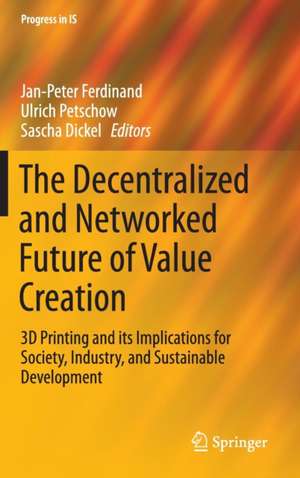The Decentralized and Networked Future of Value Creation: 3D Printing and its Implications for Society, Industry, and Sustainable Development: Progress in IS
Editat de Jan-Peter Ferdinand, Ulrich Petschow, Sascha Dickelen Limba Engleză Hardback – 24 mai 2016
| Toate formatele și edițiile | Preț | Express |
|---|---|---|
| Paperback (1) | 638.76 lei 6-8 săpt. | |
| Springer International Publishing – 27 mai 2018 | 638.76 lei 6-8 săpt. | |
| Hardback (1) | 644.95 lei 6-8 săpt. | |
| Springer International Publishing – 24 mai 2016 | 644.95 lei 6-8 săpt. |
Din seria Progress in IS
- 15%
 Preț: 581.36 lei
Preț: 581.36 lei - 17%
 Preț: 360.71 lei
Preț: 360.71 lei - 20%
 Preț: 939.29 lei
Preț: 939.29 lei - 18%
 Preț: 1113.09 lei
Preț: 1113.09 lei - 18%
 Preț: 725.43 lei
Preț: 725.43 lei - 15%
 Preț: 586.88 lei
Preț: 586.88 lei - 18%
 Preț: 1113.09 lei
Preț: 1113.09 lei - 8%
 Preț: 564.90 lei
Preț: 564.90 lei -
 Preț: 395.25 lei
Preț: 395.25 lei -
 Preț: 385.62 lei
Preț: 385.62 lei - 24%
 Preț: 936.30 lei
Preț: 936.30 lei - 20%
 Preț: 331.08 lei
Preț: 331.08 lei -
 Preț: 388.13 lei
Preț: 388.13 lei - 15%
 Preț: 646.75 lei
Preț: 646.75 lei - 20%
 Preț: 566.20 lei
Preț: 566.20 lei - 15%
 Preț: 637.59 lei
Preț: 637.59 lei - 18%
 Preț: 844.08 lei
Preț: 844.08 lei - 24%
 Preț: 802.99 lei
Preț: 802.99 lei - 20%
 Preț: 547.11 lei
Preț: 547.11 lei - 15%
 Preț: 644.30 lei
Preț: 644.30 lei -
 Preț: 385.25 lei
Preț: 385.25 lei - 18%
 Preț: 1251.68 lei
Preț: 1251.68 lei - 20%
 Preț: 314.39 lei
Preț: 314.39 lei -
 Preț: 386.61 lei
Preț: 386.61 lei -
 Preț: 383.50 lei
Preț: 383.50 lei -
 Preț: 382.75 lei
Preț: 382.75 lei - 15%
 Preț: 652.64 lei
Preț: 652.64 lei - 18%
 Preț: 954.62 lei
Preț: 954.62 lei - 18%
 Preț: 784.13 lei
Preț: 784.13 lei - 18%
 Preț: 726.69 lei
Preț: 726.69 lei - 15%
 Preț: 646.11 lei
Preț: 646.11 lei - 15%
 Preț: 636.80 lei
Preț: 636.80 lei - 20%
 Preț: 584.19 lei
Preț: 584.19 lei - 15%
 Preț: 658.55 lei
Preț: 658.55 lei - 15%
 Preț: 589.14 lei
Preț: 589.14 lei - 20%
 Preț: 986.01 lei
Preț: 986.01 lei -
 Preț: 421.34 lei
Preț: 421.34 lei - 20%
 Preț: 336.35 lei
Preț: 336.35 lei - 20%
 Preț: 337.00 lei
Preț: 337.00 lei - 15%
 Preț: 644.95 lei
Preț: 644.95 lei
Preț: 644.95 lei
Preț vechi: 758.77 lei
-15% Nou
Puncte Express: 967
Preț estimativ în valută:
123.43€ • 128.38$ • 101.90£
123.43€ • 128.38$ • 101.90£
Carte tipărită la comandă
Livrare economică 15-29 aprilie
Preluare comenzi: 021 569.72.76
Specificații
ISBN-13: 9783319316840
ISBN-10: 3319316842
Pagini: 210
Ilustrații: VIII, 255 p. 47 illus.
Dimensiuni: 155 x 235 x 16 mm
Greutate: 0.54 kg
Ediția:1st ed. 2016
Editura: Springer International Publishing
Colecția Springer
Seria Progress in IS
Locul publicării:Cham, Switzerland
ISBN-10: 3319316842
Pagini: 210
Ilustrații: VIII, 255 p. 47 illus.
Dimensiuni: 155 x 235 x 16 mm
Greutate: 0.54 kg
Ediția:1st ed. 2016
Editura: Springer International Publishing
Colecția Springer
Seria Progress in IS
Locul publicării:Cham, Switzerland
Cuprins
Part I: Economies of 3D Printing - Reorganizing Manufacturing.- Part II: Communities of 3D Printing - Makers, Entrepreneurs, Outlaws.- Part III: Futures of 3D Printing - Trajectories and Applications.
Notă biografică
Jan-Peter Ferdinand is a sociologist who currently works at the Institute for Ecological Economy Research and Technische Universität Berlin. His research addresses the nexus of emerging technologies and novel modes of distributed innovation, like e.g. the idiosyncrasies of community-based innovation or entrepreneurial dynamics in open source contexts.
Ulrich Petschow is an economist and is head of the environmental economics and policy unit at the Institute of Ecological and Economic Research in Berlin. His research topics include the governance of new technologies, environmental policy and paths towards sustainable development, with a special focus on new collaborative models of consumption and production. He has participated in the publication of numerous books both as author and editor.
Sascha Dickel is a sociologist and political scientist. As a senior researcher at the Munich Center for Technology in Society (TU Munich, Germany) he investigates techno-social transformations of communication, production, and culture. His current research areas are posthumanism, citizen science, making and engineering. For his PhD thesis on technological utopianism Sascha Dickel received the Philosophical Book Award 2014. Since 2015 he is a member of the working group on additive manufacturing and 3D printing of the German National Academy of Sciences Leopoldina.
Sascha Dickel is a sociologist and political scientist. As a senior researcher at the Munich Center for Technology in Society (TU Munich, Germany) he investigates techno-social transformations of communication, production, and culture. His current research areas are posthumanism, citizen science, making and engineering. For his PhD thesis on technological utopianism Sascha Dickel received the Philosophical Book Award 2014. Since 2015 he is a member of the working group on additive manufacturing and 3D printing of the German National Academy of Sciences Leopoldina.
Textul de pe ultima copertă
This book identifies, analyzes and discusses the current trends of digitalized, decentralized, and networked physical value creation by focusing on the particular example of 3D printing. In addition to evaluating 3D printing’s disruptive potentials against a broader economic background, it also addresses the technology’s potential impacts on sustainability and emerging modes of bottom-up and community-based innovation. Emphasizing these topics from economic, technical, social and environmental perspectives, the book offers a multifaceted overview that scrutinizes the scenario of a fundamental transition: from a centralized to a far more decentralized system of value creation.
Caracteristici
Describes fundamental shifts in techno-economic paradigms, with a focus on manufacturing Outlines the potentials of digitalization and decentralized technologies for new business models Develops a framework for new modes and sites of participative value creation like open innovation, FabLabs, hackerspaces, open source hardware etc. Pursues an interdisciplinary approach that yields multifaceted findings with relevance for researchers and practitioners alike Highlights emergent sustainability issues concerning new decentralized technologies and outlines governance options Includes supplementary material: sn.pub/extras













